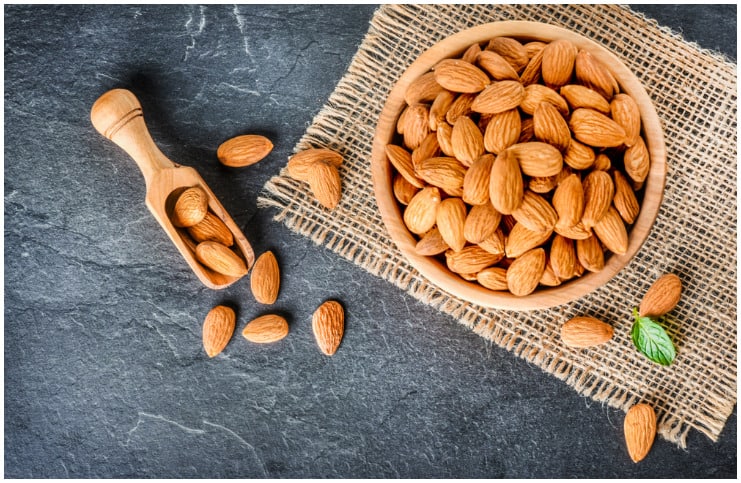Sunflower Seeds
The sunflower is an herbaceous annual plant from the Asteraceae family. There is evidence that this plant was cultivated by Native Americans as long as 3000 B.C. In the present day, China, Russian Union, Argentina, and the United States are the main producers.
These seeds can be eaten both in their de-hulled form (in which only the kernel is eaten), as well as their full “seed” form.
Nutrition Facts
They are a good source of thiamin (vitamin B1), dietary fiber, vitamin A, vitamin C, niacin, vitamin b6, folate, iron, zinc, pantothenic acid, calcium, phosphorus, potassium, betaine, magnesium, choline, copper, selenium, sodium, and manganese. Also, in a 100-gram serving, these seeds provide about 584 calories and are composed of 20 percent carbohydrates, 5 percent water, 21 percent protein, and 51 percent total fat.
Health Benefits
Antioxidant Properties
They are a remarkable source of vitamin E, a fat-soluble antioxidant that helps the body to neutralize the damage of free radicals as well as to protect cell membranes against swelling and redness.
People who consumed more vitamin E rich-foods had a lower risk of heart disease than people who did not, according to a study done at the University of Maryland Medical Center.
Furthermore, consuming these amazing seeds can reduce the symptoms of asthma, osteoarthritis, and rheumatoid arthritis, all painful disorders where free radicals and inflammation are the main issues.
Prevents Constipation
Due to their high content of soluble and insoluble fiber, these seeds can improve digestion and even prevent and cure constipation. Also, the dietary fiber content may help lower LDL and total cholesterol levels and promote a healthy weight loss since it increases the satiety levels.
Cardiovascular Health
The magnesium in these seeds is renowned for soothing the nerves, hence, easing away migraines, stress, and helping you relax.
Additionally, this essential mineral contributes to a reduction of fatigue and tiredness as well as it is involved in the maintenance of normal teeth and bones. Having sufficient magnesium levels is linked with better endothelial functioning, lower blood pressure, and reduced risk of cardiovascular disease.
Lowers Your Stress Levels
These seeds offer other health benefits especially due to their vitamin B1 content. For instance, this vitamin helps in the functioning of the body’s organs, particularly the brain, heart, kidneys, and lungs.
Like other B-complex vitamins, vitamin B1 is occasionally called an “anti-stress” vitamin due to the fact that it may boost the human body’s capacity to withstand stressful conditions.
Side Effects
There are no known side effects, except that consuming too many of these seeds can cause unwanted weight gain.
Almonds
These nuts are loaded with vital nutrients which undoubtedly give them the title of superfood. Moreover, almond milk is a delicious and nutritious beverage and can be used as a healthier alternative to cow’s milk.
For example, Indian Ayurvedic practitioners even thought that these nuts were capable of increasing intellectual ability, brain capacity, and longevity. Interestingly, almond gets 10 mentions in the Bible, where it is being described as “among the best of fruits.”
Nutrition Facts
They are high in important nutrients that can help protect the heart, including unsaturated fatty acids, phytosterols, potassium, folate, magnesium, dietary fiber, vitamin E, copper as well as manganese, protein, zinc, thiamin, calcium, iron, vitamin B6, and riboflavin.
Health Benefits
Skin Health
These nuts are a very good source of vitamin E. This antioxidant is considered a skin food because it nourishes the skin, keeping it glowing and smooth.
Additionally, the flavonoids in the skin of these nuts, mixed with vitamin E, form an effective shield against hardening of the arteries (arteriosclerosis).
Healthy Colon
The dietary fiber present in these nuts helps in detoxifying the human body. It also facilitates the food to move through the digestive system faster. More importantly, fiber is the food that the colon cells use to keep them healthy.
Excellent Source Of Minerals
They are a good source of copper and manganese, two essential trace minerals that are cofactors of superoxide dismutase. Manganese also assists in the metabolism of carbohydrates, amino acids, and fats, and helps with the production of sex hormones.
Side Effects
These nuts are relatively high in calories that is why some doctors caution against eating too many (5 per day is sufficient). However, it is essential to note that approximately 15 percent of their calories are not absorbed by the human body.
Also, in individuals with a tree nut allergy, almonds could trigger allergic reactions, including – breathlessness, swelling of the mouth, and rashes. Some specialists also say that bitter almonds should not be eaten since they contain hydrocyanic acid, a toxic chemical.
In the present day, the US is the biggest producer, but the law demands that these nuts be irradiated or pasteurized.
Tips
Eating soaked almonds may increase the level of HDL (good) cholesterol and reduce LDL cholesterol.
Sunflower Seeds vs Almonds – Which Have A Better Nutritional Profile?
Both foods have an amazing nutritional profile and should be included in our regular diet, but sunflower seeds win this contest due to their higher content of B-complex vitamins (such as – thiamin, pantothenic acid, folate, vitamin B6, and niacin) and minerals (copper and selenium).
Images credit – Shutterstock
READ THIS NEXT: Cashews vs Peanuts
References https://www.ncbi.nlm.nih.gov/pmc/articles/PMC1473600/ https://academic.oup.com/ps/article-abstract/59/10/2273/1612902?redirectedFrom=PDF https://link.springer.com/article/10.1007/BF02590302
